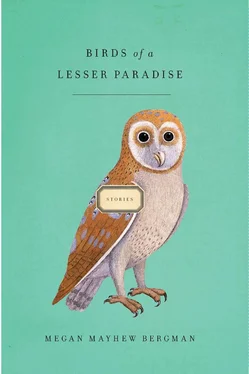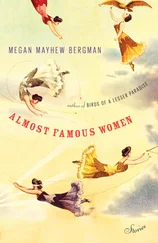Did you wash the blueberries? he asked, artfully pouring his fair trade coffee into a thermos made of corn plastic.
Always do, I said.
Are you sure this is what you need? he said, kissing my forehead.
I nodded. I was flying into Portland and renting a car. I was already looking forward to the drive from Portland to Camden; the road was quiet and old and flecked with lobster shacks and motels, sailboats hoisted into the air for hull repair, the barnacled landscape of my youth.
I wish I was going with you, Malachi said. He looked sad that I was leaving, or maybe sad to be facing a decision he so easily advised others to make.
Was there a part of him that looked at my abdomen wistfully? I wondered. That imagined a child of his own, with his hair and big ideas?
I called the zoo to let them know that I was sick and would likely be back next week. I had a good relationship with my boss and plenty of time off stored up; my absence wouldn’t be a problem. You’re missing an Asian small-clawed otter this morning, my boss said. Renal failure.
There’ll be others, I said absentmindedly.
I hope not, my boss said.
Malachi carried my bag and followed me to our car — a silver 1984 Mercedes wagon that ran diesel. We kept it parked in an underground garage a block from our town house like something we were ashamed of. That had been part of moving to a city, after all — more recruits, smaller individual footprint.
Around us people in suits were walking to work and the metro station. Most of them wore practical shoes, sipped coffee, and glided thumbs across the screens of their phones.
Malachi packed the car for me, topped off the wiper fluid, and set a roll of crackers in the front seat. He held my waist and kissed me.
I’m only driving to the airport, I said.
The wagon was hot inside and the scent of strange things baked into the upholstery across decades began to fill the air — orange juice, sweat, paint. I stuffed a cracker into my mouth to distract my senses.
We’ll figure this out, Malachi said through the open window. His body language oozed anxiety. He fumbled with the buttons on his denim shirt and I pictured him smoking on the back porch when he got home. He was okay with smoking and other vices, anything that would do us in faster.
Malachi waved as I backed the wagon out of our small parking spot, our fifty-dollars-a-month plot. He blew me a kiss that I pretended not to see and stuffed his hands in the pockets of his jeans.
When someone’s ideal is the absence of all human life, romance is kind of a joke.

My uncle had driven up to my grandmother’s cottage in Camden that morning to make sure the heat was on. He lived nearby and had become the de facto caretaker once Grandma B moved into a nursing home. He’d left dahlias the size of dinner plates in bud vases throughout the house. Their yellow petals were beginning to brown. I lifted a vase to mop a damp circle from an antique pine sideboard with my sleeve.
I’d not yet called my mother, afraid she’d hear something new in my voice. I wasn’t ready for her to be there — not when I wasn’t sure about my decision. I’d call later; she’d hear about my visit from my uncle soon enough.
My grandmother and grandfather had built the Camden cottage in the 1940s when they were first married. He’d been a dentist in town; Grandma B had taught high school biology. Even now, as she was losing her faculties, she could still explain the Krebs cycle and attributed rapid aging to her “bum mitochondria.”
Her cottage was gray and shingled with a pale green door and mature gardens. There was a water pump covered in thick black paint outside the front stoop. The antlers from a buck my grandfather had shot before he died hung over the garage entry. In the backyard, there was a small orchard of old apple trees that we stripped of fruit in the fall for cider.
I pulled my rental car into the gravel driveway and gathered my bags. Inside, the cottage smelled of old trunks and, like most historic shore houses, mildew. The original wallpaper was still up — a cream-colored base flecked with clusters of red apples and blue flowers. All of Grandma B’s sticky notes, dog-eared cookbooks, test-tube shot glasses, and ceramic animals were in the kitchen as she’d left them. The late-afternoon sun fell on the honey-colored kitchen table. I put water on and made a cup of lemon tea.
The apples are early, my uncle had written on a napkin. Cider’s in the freezer. Take some home with you .
I’d brought Malachi here a couple of times. He loved the solitude of Maine. It’s almost postapocalyptic, he’d said, as if that were a landscape he might enjoy, a place he might take vacations.
Last November the family had gathered to do a final Thanksgiving dinner in the house with Grandma B before she moved into the nursing facility. The fall sky had been bleak and Grandma sat near the woodstove. My mother, trying her best to ignore Malachi, had doted on her mother, caressing her worn hand, topping off her wine, placing a generous dollop of crème fraîche on her strawberry rhubarb pie.
Are you tired? Mom had asked her.
Just a little oxidative stress, Grandma B said, pulling her thick black glasses low on her nose and raising her eyebrows playfully.
Now the house, without my family, was bare and hushed. Yet I felt connected to my grandmother, my mother, this rugged line of hardy women with sharp ideas and heirloom casseroles, so in love with the world. Their nails packed with garden dirt, their speech full of sayings from old songs and relatives: Does last night’s fun bear the light of morning’s reflection?
I wanted, then, to become what I most admired, what now seemed most real to me. I wanted to be that exalted, complicated presence in someone’s life, the familiar body, the source of another’s existence. But I knew what I wanted was not always what I needed.
Between the cat-worn sofas and antique lamps there were long shadows in the house, filaments of lives. Maybe I’d rent the house for the year, take a leave from my job, hunker down with family support and raise a child. But was it practical?
I’d be coming into motherhood alone. This would not be my mother’s life, or my grandmother’s marriage. There would be no family portraits, no husband to share in the late-night shifts or stomach flu. No partner, at least in the immediate future, to trade anxieties with — worries about vaccines, the school bus, dwindling water supplies, pollutants from small-engine vehicles and lawn mowers.
I envied my mother’s childhood, the awe with which she’d turned to her country and the world, the confidence she’d had in her right to exist and bear children. The world and mothers alike, I knew, had lost a little freshness.
It was four in the afternoon, and I had roughly two and a half hours before sunset. I threw on an extra sweater — something of Grandma B’s that was left in the closet — grabbed a few apples from the tree in the backyard, and drove the car through an old campground to the summit of nearby Mt. Battie. I ate an apple as I drove, juices running down my hand and wrist.
The view from the mountain had always been one of my favorites. Below, rocky beaches framed the Atlantic into Penobscot Bay, a blue expanse punctuated by sailboats and the humps of small islands, hundreds of them, covered in evergreens.
I pictured Mom steering her red kayak around the islands, watching serenely as a humpback or minke lunged and dove before her, coming up to blow near the bow of her boat. She’d told me two things about whales last summer. One was that today’s whales sing lower songs, and no one knows why.
Читать дальше













